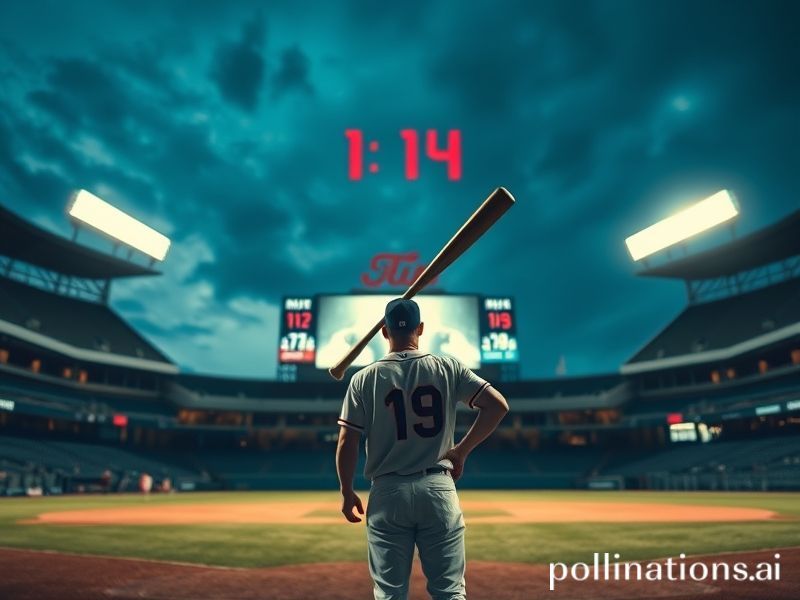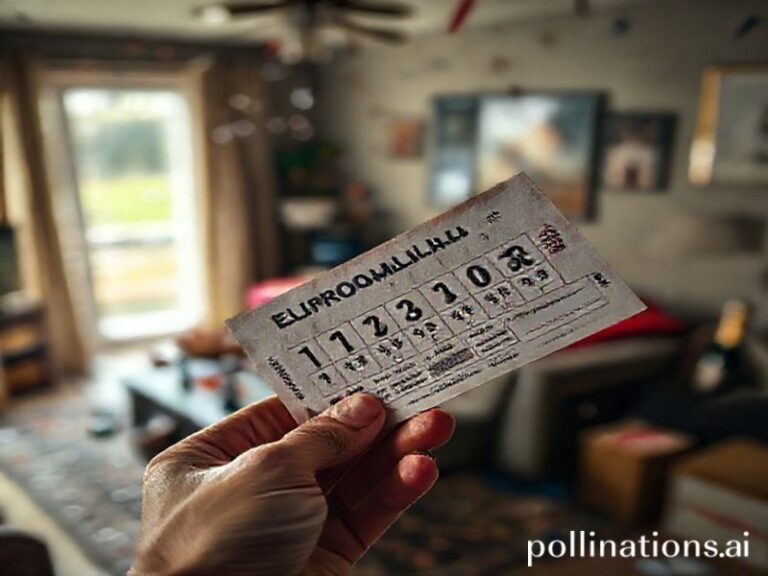Home-Run Diplomacy: How Judge and Ohtani Accidentally Became the World’s Favorite Superpower Envoys
Home-Run Diplomacy: How Aaron Judge and Shohei Ohtani Accidentally Became Soft-Power Envoys
By Dave’s Locker Global Desk
TOKYO—While the world’s foreign ministries argue over tariffs and tweets, the two men most likely to decide the 2024 MLB home-run crown are conducting their own brand of shuttle diplomacy—one swing at a time. Aaron Judge, the 6-foot-7 human eclipse currently terrorizing American League pitchers, and Shohei Ohtani, the Japanese unicorn who moonlights as both slugger and ace, have turned the humble long ball into a geopolitical event.
Consider the optics: Judge’s moonshots land in Yankee Stadium’s upper deck like unsolicited IMF loan packages—loud, heavy, and impossible to ignore. Ohtani’s, meanwhile, arc over Dodger Stadium like perfectly timed export subsidies, subsidizing the hopes of an entire Pacific archipelago. Both men are on pace to clear 50 homers, a figure that translates, in today’s exchange rates, to roughly 0.7 Brexit referendums or 1.2 FIFA bribery scandals.
The international reverberations are already audible. In Seoul, bar owners have stopped televising K-League matches during Dodgers games because patrons riot when Ohtani strikes out. In Caracas, teenage infielders now practice calling their shots in Japanese, hoping to be scouted by a Pacific Rim franchise desperate for the next two-way demigod. And in London, where MLB keeps staging regular-season games like a rich uncle forcing family reunions, pubs report a 300 % spike in broken pint glasses every time Judge’s Statcast distance exceeds 450 feet.
Behind the raw numbers lies a darker comedy. While the planet burns and supply chains crumble, global attention fixates on whether a man from Linden, California can out-slug a man from Oshu, Japan. It’s as if the United Nations replaced its Security Council with a Home Run Derby bracket and handed out veto power in souvenir bats.
Yet the symbolism is irresistible. Judge represents the last gasp of American exceptionalism: all corn-fed torque and manifest destiny condensed into 36 ounces of maple. Ohtani, conversely, is the post-war Japanese miracle in cleats—efficient, bilingual, and annoyingly good at everything. When they homer on the same night, Twitter’s servers groan like over-leveraged emerging markets.
Bookmakers in Macau now list “Judge vs. Ohtani HR crown” alongside odds on Taiwan Strait tensions and EU grain harvests. Crypto bros have minted NFTs of each blast, tokens that promise future value but currently trade like Argentine pesos. Even the Kremlin, in its own droll fashion, has noticed: state television recently suggested Judge’s power comes from “special military-grade protein,” which is either propaganda or the worst sports nutrition ad ever conceived.
And what of the also-rans? Venezuela’s Ronald Acuña Jr. and the Dominican’s Julio Rodríguez are chasing their own nationalist narratives, reminding us that the Global South still exports raw power even when the North won’t buy its bananas. Their homers land like remittance checks—brief, glorious, and immediately taxed.
Baseball’s front offices, ever the subtle imperialists, have responded by raising outfield walls and deadening baseballs, the sporting equivalent of currency devaluation. It won’t work. You can’t embargo charisma any more than you can sanction gravity. The balls will keep flying, the highlight reels will keep looping, and somewhere in Brussels a bureaucrat will draft a regulation titled “Directive 2024/42 on Fair Launch Angles.”
So, as Judge and Ohtani march toward 60, remember: every dinger is a tiny act of soft-power aggression. Each upper-deck souvenir is a passport stamp in a world that can’t agree on much else. And if the season ends in a tie? Expect a joint press conference in Geneva where both sluggers solemnly agree to share the crown, thereby solving nothing and delighting everyone—a perfect metaphor for international cooperation in our current century.
Bottom line: When the final box score is tallied, the real winner will be the global attention economy, which will have successfully monetized our collective need for something—anything—to root for that doesn’t involve an election cycle or an IPCC report. The home-run crown may reside in New York or Los Angeles, but the true spoils belong to the planet’s exhausted doomscrollers, who for a few nightly innings can pretend the only thing at stake is leather and distance.







